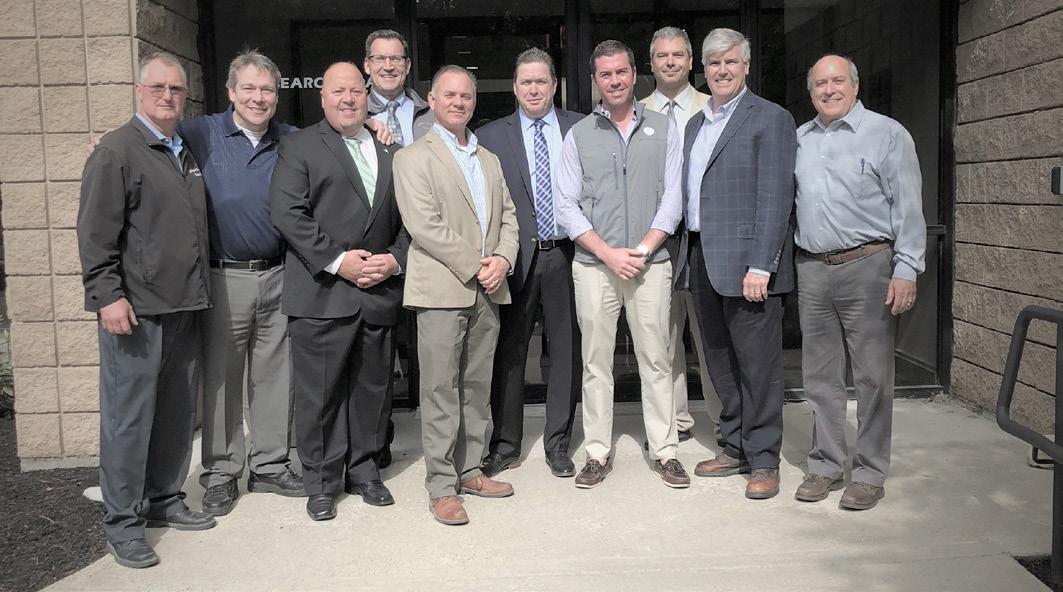
7 minute read
INVESTING IN PEOPLE
By / Natalie Bruckner Photos courtesy of 617MediaGroup INVESTING IN PEOPLE

“Surround yourself with the best people and treat them the way you want to be treated.” This is the business philosophy that Kevin Gill Sr, president of McCusker-Gill Inc. in Hingham, Massachusetts, has lived by since he purchased and incorporated the company back in 1991—and it’s a philosophy that has served him well.
In less than 30 years, Gill Sr., the recipient of the 2019 SNIPS Sheet Metal Fabrication Contractor of the Year award, has managed to build the largest sheet metal operation in the Greater Boston area.
“The McCusker company was owned by another mechanical contractor, the Fred Williams Company, and most of the sheet metal work it performed was direct for Fred Williams,” Gill Sr. explains. “When I purchased the company in 1991, we had around 10 employees.”
In its first year of business, McCusker-Gill did around $1.2 million in revenue, and a year later, the company was awarded a project at the Boston Public Library. “That really put us on the map,” Gill Sr. says. “It was worth about $450,000, which would probably be a couple million dollars today. We purchased our first coil line in 1993, and by 1995, we had become the largest sheet metal contractor in the Boston market according to working hours logged.”
The company quickly outgrew its 7,500-square-foot facility and moved to a 25,000-square-foot facility just south of Boston. “We experienced considerable growth during the dotcom bubble, when we remained the largest sheet metal contractor in the Boston market by a considerable margin,” Gill Sr. says. A few years later, in 2015, the company once again outgrew its facility and relocated to a 60,000-square-foot facility where Gill Sr. introduced a new coil line along with several other new shop and office upgrades.
Today, the company averages approximately $75 million in annual revenue, has a staff of around 200 employees, and remains the largest sheet metal contractor in the Boston area. One ingredient to the company’s success is its progressive approach, as Gill Sr. believes in investing heavily in new products, technologies, and systems. However, the area where Gill Sr. invests the most is people. Whether that’s indirectly on the production side, with new production equipment to ensure staff have what they need to manufacture ducts as efficiently as possible; on the safety side with investments in new equipment and training; or, perhaps most importantly, directly in time, by listening to staff and ensuring lines of communication remain open from their very first day with the company.
“We invest a lot of time and resources into the apprentice recruitment process and really try to identify the best candidates for apprenticeship,” Gill Sr. explains. “Throughout the apprenticeship program, we proactively try to pair apprentices with mentors that can help them learn the trade. We rotate them through the shop and field, and also through different types of projects to help them get exposure to all types of work. We solicit feedback on our apprentices and try to identify the next generation of emerging leaders. We invest a lot into the development of those apprentices, including sending them to many of the leadership, supervisory, and foremen seminars that SMACNA offers.”
As a result, the company sees little to no turnover. “We treat our employees very well because we believe good morale is vital to our success,” Gill Sr. says.
This approach isn’t exclusive within the company either, he adds. It’s a philosophy that applies to labor-management relationships, as well. Establishing and maintaining a healthy relationship is, Gill Sr. says, essential to the success of his business and the industry as a whole. “Healthy labormanagement cooperation is vital to our success. We are extremely proud to be a union sheet metal contractor and that our employees are able to earn a fair wage with great healthcare and benefits. Our customers know that when they hire us, they are getting skilled and qualified labor and that the work will be top-notch.
“We share many of the same objectives as our labormanagement partners, and it’s really important for us to find common ground and to work together to achieve collective goals,” he adds. “We have a great apprenticeship program, and we rely on our local JATC to continue to supply us with skilled and trained workers. In booming markets, our labormanagement partnership helps make sure all of our labor needs are met, and in slow times, it can help us to find ways to make sure we keep people working,” Gill Sr. says.
It’s an attitude that is mirrored at Local 17, which represents more than 2,700 skilled and licensed workers throughout Massachusetts, Maine, New Hampshire, and Rhode Island. Bob Butler, business manager at Local 17 (who worked for Gill Sr. from 2000 to 2002 before becoming an agent), echoes this approach to labor-management cooperation, which seems to be helping the industry flourish in Boston.
“We have a good relationship with our contractors,” Butler says. “We have an understanding that we need each other and, while we may have our differences of opinion at times, it’s a partnership, and we are in this together.”
It’s not just lip service, either. The numbers speak for themselves. In 10 years, Local 17 has seen one, maybe two grievances, which tells a compelling story. “We talk ... a lot,” Butler says. “Whether that’s about work coming up and jobs we can bid on both inside and outside the Boston core, or ways to get creative and ensure we continue to thrive even during downturns. There is a lot of respect between labor and management because, after all, business is business and we will still have a beer after hours,” Butler says.
Local 17 and McCusker-Gill Inc. are currently demonstrating partnership in action with a new initiative that focuses on their shared ambition to expand opportunities for contractors and their workforces in and around the area. Together, they are moving beyond jobs in the healthcare sector and breaking into the residential market.
“There have been a lot of projects within our jurisdiction where items such as boiler flues, HVAC louvers, and lab exhaust equipment have been assigned to trades other than the sheet metal workers,” Gill Sr. says. “We have partnered with our Local to protect this work and keep it within the sheet metal worker’s scope. We have worked cooperatively
“Healthy labor-management cooperation is vital to our success,” says Kevin Gill Sr., president of McCusker-Gill Inc.

and successfully to achieve this on many projects in the past several months.”
Both Gill Sr. and Butler know this will take time, education, and outreach, but this is nothing new to them. They say that you just need to look at their current discussions over the prevailing wage challenges in the area and how contractors and the union are working hard to close a loophole to create a level playing field for all.
“Our partnerships help us set the standard for excellence in New England’s building trades,” Butler says. “It’s especially great when these partnerships and the skills of Local 17’s hardworking men and women are recognized nationally.”
For Gill Sr., this cooperation extends beyond labormanagement, and includes SMACNA contractors working together to learn from one another. “We really value our fellow SMACNA partners, and we rely on those relationships tremendously,” he says. “Our strong relationships with contractors in other markets allow us to share information freely in a mutually beneficial way. When we encounter a new challenge or scenario, we have several SMACNA contractors in other parts of the country that we can reach out to for guidance.”
When McCusker-Gill recently moved to the new facility, Gill Sr. asked SMACNA who the leaders in prefabrication were and toured multiple facilities across the country. “We incorporated ideas that we saw into our own final shop layout,” he says. “Today, we routinely host SMACNA partners from other parts of the country who come to see our operation.”
Looking ahead, Gill Sr. and Butler agree that maintaining and growing the union market share will continue to be an ongoing challenge both locally and nationally. They say ongoing cooperation from both sides will be the key and will eventually result in achieving common goals that benefit all sides. ▪
Natalie is an award-winning writer who has worked in the United Kingdom, Germany, Spain, the United States, and Canada. She has more than 23 years experience as a journalist, editor and brand builder, specializing in construction and transportation. When she’s not writing, you will likely find her snowboarding, mountain biking, or climbing mountains with her rescue dog.






